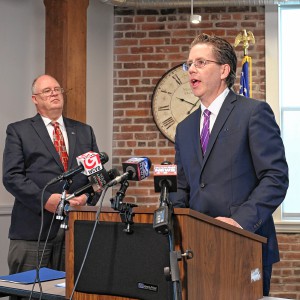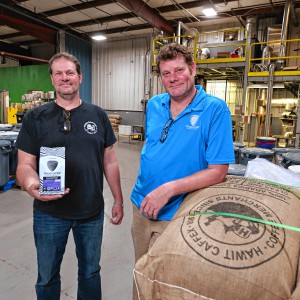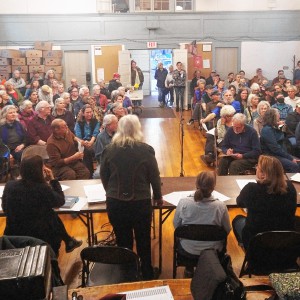Food caucus outlines goals: Legislation focuses on food access, farmland and economic development
| Published: 07-25-2023 4:32 PM |
BOSTON — Food access and insecurity, farmland and economic development top the list of priorities for the current legislative session for the Food System Caucus, one of the largest caucuses in the Massachusetts Legislature that’s co-chaired by Sen. Jo Comerford and Rep. Mindy Domb.
Among the eight priority pieces of legislation are bills that support universal school meals, agricultural tax breaks, the Healthy Incentives Program (HIP), and other efforts to support farmers and food access.
Comerford, D-Northampton, said the caucus has embraced the White House “Challenge to End Hunger and Build Healthy Communities,” which calls on stakeholders across the country to take action to “end hunger and reduce diet-related diseases” by 2030, per a White House press release.
“We’ve also added for ourselves strengthening farms and farmers and the Massachusetts food system,” Comerford said. “The legislation is in the buckets of … policy areas that would, for example, make it more financially possible for farmers to continue farming.”
The Food System Caucus is made up of 158 bipartisan members. In addition to Comerford and Domb, the caucus is led by Rep. Hannah Kane, R-Shrewsbury; Rep. Andy Vargas, D-Haverhill; Rep. Paul Schmid III, D-Westport; Rep. Dan Donahue, D-Worcester; and Sen. Sal DiDomenico, D-Everett.
The three main areas of focus around which the Food System Caucus based its priorities include: reducing food waste and making fresh food accessible to everyone; protecting and preserving farmland; and promoting economic development in the food, farming and seafood industries. The caucus endorsed 20 other pieces of legislation that fall under those same categories.
The first bill under the category of food insecurity aims to provide free meals to all public school students permanently.
Another bill, sponsored by Comerford and Kane, would expand food donation liability protections.
Article continues after...
Yesterday's Most Read Articles
 1989 homicide victim found in Warwick ID’d through genetic testing, but some mysteries remain
1989 homicide victim found in Warwick ID’d through genetic testing, but some mysteries remain
 Fogbuster Coffee Works, formerly Pierce Brothers, celebrating 30 years in business
Fogbuster Coffee Works, formerly Pierce Brothers, celebrating 30 years in business
 Greenfield homicide victim to be memorialized in Pittsfield
Greenfield homicide victim to be memorialized in Pittsfield
 Real Estate Transactions: May 3, 2024
Real Estate Transactions: May 3, 2024
 Battery storage bylaw passes in Wendell
Battery storage bylaw passes in Wendell
 As I See It: Between Israel and Palestine: Which side should we be on, and why?
As I See It: Between Israel and Palestine: Which side should we be on, and why?
“It simply says: farmers are already donating a good deal of their crops. Let’s give them a tax credit to do it, and let’s remove all liability from them,” said Comerford, adding that as farmers deal with climate change-related weather events like recent flooding, legislation like this “is in the larger puzzle board of how the heck do farmers make a living.”
Another bill, co-sponsored by Domb, would establish the Massachusetts Hunger-Free Campus Initiative, which would give two- and four-year public colleges grants to address food insecurity.
An additional Domb-sponsored initiative would establish the Healthy Incentives Program (HIP) by law. The HIP program provides Supplemental Nutrition Assistance Program (SNAP) recipients a $1 credit for every $1 spent on Massachusetts-grown produce at farmers markets and farm stands.
Rep. Natalie Blais, D-Deerfield, and Comerford co-sponsored a bill that aims to strengthen local food systems. The bill includes a host of reforms to state law such as creating a state food system coordinator position and establishing a training program for new farmers.
“We’ve heard from farmers, we’ve heard from farm advocates,” Comerford began. “This is everything from the rising generation of farmers, who we hope to attract, how they get land … to help get out and help farmers understand what grants and technical help is out there.”
Two bills under the economic development category have to do with tax relief. The first promotes urban agriculture by giving cities the opportunity to adopt a property tax break for commercial urban agricultural land.
The other tax-related bill would make farmers with smaller properties eligible for tax relief by removing a 5-acre requirement. Comerford, who co-sponsored the bill, said the acreage requirement is outdated, and farmland parcels are generally smaller and more difficult to find now than they were when the article was created.
The final endorsement is for an act “supporting farm diversification and sustainability,” which would give the Massachusetts Department of Agricultural Resources more leeway to provide permits for non/quasi-agricultural activities on farms.
Endorsed legislation touches on other aspects of food donation, food justice, food waste, PFAS (per- or polyfluoroalkyl substances) contamination, pollinator protection, milk production and hemp cultivation.
“There is an existential crisis in farming currently,” Comerford said. “It’s an economic development intersection, and it’s a food security and equity intersection, all at the same time. So we have to help farmers not only make a living but now also adapt to climate change, and if we don’t, it’s at our peril.”
All the bills will be given a public hearing before February 2024, after which committees have a deadline to take action.
Maddie Fabian can be reached at mfabian@gazettenet.com or on Twitter @MaddieFabian.

 Bridge of Flowers in Shelburne Falls to open on plant sale day, May 11
Bridge of Flowers in Shelburne Falls to open on plant sale day, May 11 Community Legal Aid expands Disability Benefits Project to Franklin County
Community Legal Aid expands Disability Benefits Project to Franklin County Wear Orange organizers prepare display to remember gun violence victims
Wear Orange organizers prepare display to remember gun violence victims Deerfield candidates, Whately incumbent discuss issues with voters at South County Senior Center
Deerfield candidates, Whately incumbent discuss issues with voters at South County Senior Center
